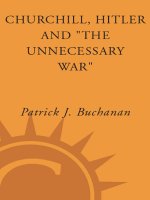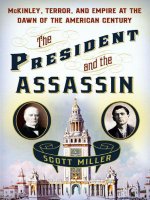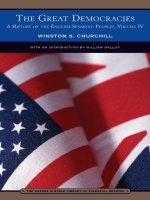Patrick j buchanan churchill, hitler, and the un rld (v5 0)
Bạn đang xem bản rút gọn của tài liệu. Xem và tải ngay bản đầy đủ của tài liệu tại đây (4.05 MB, 420 trang )
CONTENTS
ITLE PAGE
DEDICATION
EPIGRAPH
PREFACE: What Happened to Us?
NTRODUCTION: The Great Civil War of the West
The End of “Splendid Isolation”
Last Summer of Yesterday
“A Poisonous Spirit of Revenge”
“A Lot of Silly Little Cruisers”
1935: Collapse of the Stresa Front
1936: The Rhineland
1938: Anschluss
Munich
Photo Insert
Fatal Blunder
0 April Fools
1 “An Unnecessary War”
2 Gruesome Harvest
3 Hitler’s Ambitions
4 Man of the Century
5 America Inherits the Empire
NOTES
BIBLIOGRAPHY
ACKNOWLEDGMENTS
ABOUT THE AUTHOR
ALSO BY PATRICK J. BUCHANAN
COPYRIGHT
To Regis, William, James, and Arthur Crum
My Mother’s Brothers
and Veterans of World War II
I HAVE A STRONG belief that there is a danger of the public opinion of this country…believing that
it is our duty to take everything we can, to fight everybody, and to make a quarrel of every
dispute. That seems to me a very dangerous doctrine, not merely because it might incite other
nations against us…but there is a more serious danger, that is lest we overtax our strength.
However strong you may be, whether you are a man or a nation, there is a point beyond which
your strength will not go. It is madness; it ends in ruin if you allow yourself to pass beyond it.1
—LORD SALISBURY, 1897
The Queen’s Speech
[A] EUROPEAN WAR can only end in the ruin of the vanquished and the scarcely less fatal
commercial dislocation and exhaustion of the conquerors. Democracy is more vindictive than
Cabinets. The wars of peoples are more terrible than those of kings.2
—WINSTON CHURCHILL, 1901
Speech to Parliament
PREFACE
What Happened to Us?
AND IT CAME to pass, when they were in the field, that Cain rose up against his brother Abel
and slew him.
—GENESIS, 4:8
ALL ABOUT US we can see clearly now that the West is passing away.
In a single century, all the great houses of continental Europe fell. All the empires that ruled the
world have vanished. Not one European nation, save Muslim Albania, has a birthrate that will enable
it to survive through the century. As a share of world population, peoples of European ancestry have
been shrinking for three generations. The character of every Western nation is being irremediably
altered as each undergoes an unresisted invasion from the Third World. We are slowly disappearing
from the Earth.
Having lost the will to rule, Western man seems to be losing the will to live as a unique
civilization as he feverishly indulges in La Dolce Vita, with a yawning indifference as to who might
inherit the Earth he once ruled.
What happened to us? What happened to our world?
When the twentieth century opened, the West was everywhere supreme. For four hundred years,
explorers, missionaries, conquerors, and colonizers departed Europe for the four corners of the Earth
to erect empires that were to bring the blessings and benefits of Western civilization to all mankind.
In Rudyard Kipling’s lines, it was the special duty of Anglo-Saxon peoples to fight “The savage wars
of peace/Fill full the mouth of Famine/And bid the sickness cease.” These empires were the creations
of a self-confident race of men.
Whatever became of those men?
Somewhere in the last century, Western man suffered a catastrophic loss of faith—in himself, in his
civilization, and in the faith that gave it birth.
That Christianity is dying in the West, being displaced by a militant secularism, seems undeniable,
though the reasons remain in dispute. But there is no dispute about the physical wounds that may yet
prove mortal. These were World Wars I and II, two phases of a Thirty Years’ War future historians
will call the Great Civil War of the West. Not only did these two wars carry off scores of millions of
the best and bravest of the West, they gave birth to the fanatic ideologies of Leninism, Stalinism,
Nazism, and Fascism, whose massacres of the people they misruled accounted for more victims than
all of the battlefield deaths in ten years of fighting.
A quarter century ago, Charles L. Mee, Jr., began his End of Order: Versailles 1919 by describing
the magnitude of what was first called the Great War: “World War I had been a tragedy on a dreadful
scale. Sixty-five million men were mobilized—more by many millions than had ever been brought to
war before—to fight a war, they had been told, of justice and honor, of national pride and of great
ideals, to wage a war that would end all war, to establish an entirely new order of peace and equity
in the world.”1
Mee then detailed the butcher’s bill.
By November 11, 1918, when the armistice that marked the end of the war was signed, eight
million soldiers lay dead, twenty million more were wounded, diseased, mutilated, or spitting
blood from gas attacks. Twenty-two million civilians had been killed or wounded, and the
survivors were living in villages blasted to splinters and rubble, on farms churned in mud, their
cattle dead.
In Belgrade, Berlin and Petrograd, the survivors fought among themselves—fourteen wars,
great or small, civil or revolutionary, flickered or raged about the world.2
The casualty rate in the Great War was ten times what it had been in America’s Civil War, the
bloodiest war of Western man in the nineteenth century. And at the end of the Great War an influenza
epidemic, spread by returning soldiers, carried off fourteen million more Europeans and Americans. 3
In one month of 1914—“the most terrible August in the history of the world,” said Sir Arthur Conan
Doyle—“French casualties…are believed to have totaled two hundred sixty thousand of whom
seventy-five thousand were killed (twenty-seven thousand on August 22 alone).” 4 France would fight
on and in the fifty-one months the war would last would lose 1.3 million sons, with twice that number
wounded, maimed, crippled. The quadrant of the country northeast of Paris resembled a moonscape.
Equivalent losses in America today would be eight million dead, sixteen million wounded, and all
the land east of the Ohio and north of the Potomac unrecognizable. Yet the death and destruction of the
Great War would be dwarfed by the genocides of Lenin, Stalin, Hitler, and what the war of 1939–
1945 would do to Italy, Germany, Poland, Ukraine, the Baltic and Balkan nations, Russia, and all of
Europe from the Pyrenees to the Urals.
The questions this book addresses are huge but simple: Were these two world wars, the mortal
wounds we inflicted upon ourselves, necessary wars? Or were they wars of choice? And if they were
wars of choice, who plunged us into these hideous and suicidal world wars that advanced the death of
our civilization? Who are the statesmen responsible for the death of the West?
INTRODUCTION
The Great Civil War of the West
[W]AR IS THE creation of individuals not of nations.1
—SIR PATRICK HASTINGS, 1948
British barrister and writer
OF ALL THE EMPIRES of modernity, the British was the greatest—indeed, the greatest since Rome—
encompassing a fourth of the Earth’s surface and people. Out of her womb came America, Canada,
Australia, New Zealand, and Ireland, five of the finest, freest lands on Earth. Out of her came Hong
Kong and Singapore, where the Chinese first came to know freedom. Were it not for Britain, India
would not be the world’s largest democracy, or South Africa that continent’s most advanced nation.
When the British arrived in Africa, they found primitive tribal societies. When they departed, they left
behind roads, railways, telephone and telegraph systems, farms, factories, fisheries, mines, trained
police, and a civil service.
No European people fondly remembers the Soviet Empire. Few Asians recall the Empire of Japan
except with hatred. But all over the world, as their traditions, customs, and uniforms testify, men
manifest their pride that they once belonged to the empire upon whose flag the sun never set. America
owes a special debt to Britain, for our laws, language and literature, and the idea of representative
government. “[T]he transplanted culture of Britain in America,” wrote Dr. Russell Kirk, “has been
one of humankind’s more successful experiments.”2
As with most empires, the sins of the British are scarlet—the opium wars in China, the cold
indifference to Irish suffering in the Potato Famine. But Britain’s sins must be weighed in the balance.
It was the British who were first to take up arms against slavery, who, at Trafalgar and Waterloo,
were decisive in defeating the Napoleonic dictatorship and empire, who, in their finest hour, held on
until Hitler was brought down.
Like all empires, the British Empire was one day fated to fall. Once Jefferson’s idea, “All men are
created equal,” was wedded to President Wilson’s idea, that all peoples are entitled to “selfdetermination,” the fate of the Western empires was sealed. Wilson’s secretary of state, Robert
Lansing, saw it coming: “The phrase [self-determination] is simply loaded with dynamite. It will
raise hopes which can never be realized…. What a calamity that the phrase was ever uttered! What
misery it will cause!”3
Twenty-five years after Versailles, Walter Lippmann would denounce Wilson’s doctrine of selfdetermination as “barbarous and reactionary.”
Self-determination, which has nothing to do with self-government but has become confused with
it, is barbarous and reactionary: by sanctioning secession, it invites majorities and minorities to
be intransigent and irreconcilable. It is stipulated in the principle of self-determination that they
need not be compatriots because they will soon be aliens. There is no end to this atomization of
human society. Within the minorities who have seceded there will tend to appear other
minorities who in their turn will wish to secede.4
WILSON’S DOCTRINE OF SELF-DETERMINATION
destroyed the Western empires.
But while the fall of the British Empire was inevitable, the suddenness and sweep of the collapse
were not. There is a world of difference between watching a great lady grandly descend a staircase
and seeing a slattern being kicked down a flight of stairs.
Consider: When Winston Churchill entered the inner cabinet as First Lord of the Admiralty in
1911, every nation recognized Britain’s primacy. None could match her in the strategic weapons of
the new century: the great battle fleets and dreadnoughts of the Royal Navy. Mark Twain jested that
the English were the only modern race mentioned in the Bible, when the Lord said, “Blessed are the
meek, for they shall inherit the earth.”5
Yet by Churchill’s death in 1965, little remained. “Of that colossal wreck, boundless and bare/The
lone and level sands stretch far away.” 6 At century’s end, Labour Party elder statesman Sir Roy
Denman looked back at the decline and fall of the nation and empire into which he had been born:
At the beginning [of the twentieth century], Britain, as the centre of the biggest empire in the
world, was at the zenith of her power and glory; Britain approaches the end as a minor power,
bereft of her empire…. [O]n the world stage, Britain will end the century little more important
than Switzerland. It will have been the biggest secular decline in power and influence since
seventeenth-century Spain.7
? What happened to the Empire? What happened to the West and
our world—is what this book is about.
WHAT HAPPENED TO GREAT BRITAIN
For it was the war begun in 1914 and the Paris peace conference of 1919 that destroyed the
German, Austro-Hungarian, and Russian empires and ushered onto the world stage Lenin, Stalin,
Mussolini, and Hitler. And it was the war begun in September 1939 that led to the slaughter of the
Jews and tens of millions of Christians, the devastation of Europe, Stalinization of half the continent,
the fall of China to Maoist madness, and half a century of Cold War.
Every European war is a civil war, said Napoleon. Historians will look back on 1914–1918 and
1939–1945 as two phases of the Great Civil War of the West, where the once-Christian nations of
Europe fell upon one another with such savage abandon they brought down all their empires, brought
an end to centuries of Western rule, and advanced the death of their civilization.
In deciphering what happened to the West, George F. Kennan, the geostrategist of the Cold War,
wrote, “All lines of inquiry lead back to World War I.” 8 Kennan’s belief that World War I was “the
original catastrophe” was seconded by historian Jacques Barzun, who called the war begun in August
1914 “the blow that hurled the modern world on its course of self-destruction.”9
These two world wars were fratricidal, self-inflicted wounds of a civilization seemingly hell-bent
on suicide. Eight million soldiers perished in World War I, “twenty million more were wounded,
diseased, mutilated, or spitting blood from gas attacks. Twenty-two million civilians had been killed
or wounded….”10 That war would give birth to the fanatic and murderous ideologies of Leninism,
Stalinism, Nazism, and Fascism, and usher in the Second World War that would bring death to tens of
millions more.
And it was Britain that turned both European wars into world wars. Had Britain not declared war
on Germany in 1914, Canada, Australia, South Africa, New Zealand, and India would not have
followed the Mother Country in. Nor would Britain’s ally Japan. Nor would Italy, which London
lured in with secret bribes of territory from the Habsburg and Ottoman empires. Nor would America
have gone to war had Britain stayed out. Germany would have been victorious, perhaps in months.
There would have been no Lenin, no Stalin, no Versailles, no Hitler, no Holocaust.
Had Britain not given a war guarantee to Poland in March 1939, then declared war on September
3, bringing in South Africa, Canada, Australia, India, New Zealand, and the United States, a GermanPolish war might never have become a six-year world war in which fifty million would perish.
Why did Britain declare war on Germany, twice? As we shall see, neither the Kaiser nor Hitler
sought to destroy Britain or her empire. Both admired what Britain had built. Both sought an alliance
with England. The Kaiser was the eldest grandson of Queen Victoria. Thus the crucial question: Were
these two devastating wars Britain declared on Germany wars of necessity, or wars of choice?
Critics will instantly respond that Britain fought the First World War to bring down a Prussian
militarism that threatened to dominate Europe and the world, that Britain declared war in 1939 to
stop a fanatic Nazi dictator who would otherwise have conquered Europe and the world, enslaved
mankind, massacred minorities on a mammoth scale, and brought on a new Dark Age. And thank God
Britain did declare war. Were it not for Britain, we would all be speaking German now.
Yet, in his memoir, David Lloyd George, who led Britain to victory in World War I, wrote, “We
all blundered into the war.” 11 In his memoirs, Churchill, who led Britain to victory in World War II,
wrote:
One day President Roosevelt told me that he was asking publicly for suggestions about what the
war should be called. I said at once, “The Unnecessary War.” There never was a war more easy
to stop than that which has just wrecked what was left of the world from the previous struggle.12
WAS LLOYD GEORGE RIGHT? Was World War I the result of blunders by British statesmen? Was
Churchill right? Was the Second World War that “wrecked what was left of the world” an
“unnecessary war”? If so, who blundered? For these were the costliest and bloodiest wars in the
history of mankind and they may have brought on the end of Western civilization.
About the justice of the causes for which Britain fought, few quarrel. And those years from 1914 to
1918 and 1939 to 1945 produced days of glory that will forever inspire men and reflect greatly upon
the British people. Generations may pass away, but men will yet talk of Passchendaele and the
Somme, of Dunkirk and El Alamein. Two-thirds of a century later, men’s eyes yet mist over at the
words “Fighter Command,” the men and boys in their Hurricanes and Spitfires who rose day after day
as the knights of old in the Battle of Britain to defend their “island home.” And in their “finest hour”
the British had as the king’s first minister a statesman who personified the bulldog defiance of his
people and who was privileged by history to give the British lion its roar. In the victory over Nazi
Germany, the place of moral honor goes to Britain and Churchill. He “mobilized the English language
and sent it into battle,” said President Kennedy, when Churchill, like Lafayette, was made an
honorary citizen of the United States.
Thus the question this book addresses is not whether the British were heroic. That is settled for all
time. But were their statesmen wise? For if they were wise, how did Britain pass in one generation
from being mistress of the most awesome of empires into a nation whose only hope for avoiding
defeat and ruin was an America that bore no love for the empire? By 1942, Britain relied on the
United States for all the necessities of national survival: the munitions to keep fighting, the ships to
bring her supplies, the troops to rescue a continent from which Britain had been expelled in three
weeks by the Panzers of Rommel and Guderian. Who blundered? Who failed Britain? Who lost the
empire? Was it only the appeasers, the Guilty Men?
There is another reason I have written this book.
There has arisen among America’s elite a Churchill cult. Its acolytes hold that Churchill was not
only a peerless war leader but a statesman of unparalleled vision whose life and legend should be the
model for every statesman. To this cult, defiance anywhere of U.S. hegemony, resistance anywhere to
U.S. power becomes another 1938. Every adversary is “a new Hitler,” every proposal to avert war
“another Munich.” Slobodan Milosevic, a party apparatchik who had presided over the disintegration
of Yugoslavia—losing Slovenia, Croatia, Macedonia, and Bosnia—becomes “the Hitler of the
Balkans” for holding Serbia’s cradle province of Kosovo. Saddam Hussein, whose army was routed
in one hundred hours in 1991 and who had not shot down a U.S. plane in forty thousand sorties,
becomes “an Arab Hitler” about to roll up the Persian Gulf and threaten mankind with weapons of
mass destruction.
This mind-set led us to launch a seventy-eight-day bombing campaign on Serbia, a nation that never
attacked us, never threatened us, never wanted war with us, whose people had always befriended us.
After 9/11, the Churchill cult helped to persuade an untutored president that the liberation of Iraq
from Saddam would be like the liberation of Europe from Hitler. We would be greeted in Baghdad as
our fathers and grandfathers had been in Paris. In the triumphant aftermath of a “cake-walk” war,
democracy would put down roots in the Middle East as it had in Europe after the fall of Hitler, and
George W. Bush would enter history as the Churchill of his generation, while the timid souls who
opposed his war of liberation would be exposed as craven appeasers.
This Churchill cult gave us our present calamity. If not exposed, it will produce more wars and
more disasters, and, one day, a war of the magnitude of Churchill’s wars that brought Britain and his
beloved empire to ruin. For it was Winston S. Churchill who was the most bellicose champion of
British entry into the European war of 1914 and the German-Polish war of 1939. There are two great
myths about these wars. The first is that World War I was fought “to make the world safe for
democracy.” The second is that World War II was the “Good War,” a glorious crusade to rid the
world of Fascism that turned out wonderfully well.
Not for everyone. When President Bush flew to Moscow to celebrate the sixtieth anniversary of VE Day, he stopped in one of the nations that was not celebrating, Latvia, and dispelled one of these
myths. He told the world that while “V-E Day marked the end of Fascism…it did not end
oppression,” that what FDR and Churchill did to Eastern and Central Europe in collusion with Stalin
“will be remembered as one of the greatest wrongs of history.” 13 Bush called Yalta a sellout of free
nations as shameful as Munich.
This book will argue that President Bush understated his case.
For their crimes, Hitler and his collaborators, today’s metaphors for absolute evil, received the
ruthless justice they deserved. But we cannot ignore the costs of Churchill’s wars, or the question:
Was it truly necessary that fifty million die to bring Hitler down? For World War II was the worst
evil ever to befall Christians and Jews and may prove the mortal blow that brings down our common
civilization. Was it “The Unnecessary War”?
CHAPTER 1
The End of “Splendid Isolation”
[T]HE QUEEN CANNOT help feeling that our isolation is dangerous.1
—QUEEN VICTORIA,
January 14, 1896
Isolation is much less dangerous than the danger of being dragged into wars which do not
concern us.2
—LORD SALISBURY 1896
FOR AS LONG AS he had served the queen, Lord Salisbury had sought to keep Britain free of power
blocs. “His policy was not one of isolation from Europe…but isolation from the Europe of
alliances.”3 Britannia would rule the waves but stay out of Europe’s quarrels. Said Salisbury, “We
are fish.”4
When the queen called him to form a new government for the third time in 1895, Lord Salisbury
pursued his old policy of “splendid isolation.” But in the years since he and Disraeli had traveled to
the Congress of Berlin in 1878, to create with Bismarck a new balance of power in Europe, their
world had vanished.
In the Sino-Japanese war of 1894–95, Japan defeated China, seized Taiwan, and occupied the
Liaotung Peninsula. Britain’s preeminent position in China was now history.
In the summer of 1895, London received a virtual ultimatum from secretary of state Richard Olney,
demanding that Great Britain accept U.S. arbitration in a border dispute between British Guiana and
Venezuela. Lord Salisbury shredded Olney’s note like an impatient tenured professor cutting up a
freshman term paper. But President Cleveland demanded that Britain accept arbitration—or face the
prospect of war with the United States.
The British were stunned by American enthusiasm for a war over a patch of South American
jungle, and incredulous. America deployed two battleships to Britain’s forty-four. 5 Yet Salisbury
took the threat seriously: “A war with America…in the not distant future has become something more
than a possibility.”6
London was jolted anew in January 1896 when the Kaiser sent a telegram of congratulations to
Boer leader Paul Kruger on his capture of the Jameson raiders, who had invaded the Transvaal in a
land grab concocted by Cecil Rhodes, with the connivance of Colonial Secretary Joseph
Chamberlain.
These two challenges, from a jingoistic America that was now the first economic power on earth,
and from his bellicose nephew in Berlin, Wilhelm II, revealed to the future Edward VII that “his
country was without a friend in the world” and “steps to end British isolation were required….”7
On December 18, 1897, a Russian fleet steamed into the Chinese harbor of Port Arthur, “obliging
British warships to vacate the area.”8 British jingoes “became apoplectic.”9 Lord Salisbury stood
down: “I don’t think we carry enough guns to fight them and the French together.”10
In 1898, a crisis erupted in northeast Africa. Captain Jean-Baptiste Marchand, who had set off
from Gabon in 1897 on a safari across the Sahara with six officers and 120 Senegalese, appeared at
Fashoda in the southern Sudan, where he laid claim to the headwaters of the Nile. Sir Herbert
Kitchener cruised upriver to instruct Marchand he was on imperial land. Faced with superior
firepower, Marchand withdrew. Fashoda brought Britain and France to the brink of war. Paris
backed down, but bitterness ran deep. Caught up in the Anglophobia was eight-year-old Charles de
Gaulle.11
In 1900, the Russian challenge reappeared. After American, British, French, German, and Japanese
troops had marched to the rescue of the diplomatic legation in Peking, besieged for fifty-five days by
Chinese rebels called “Boxers,” Russia exploited the chaos to send a 200,000-man army into
Manchuria and the Czar shifted a squadron of his Baltic fleet to Port Arthur. The British position in
China was now threatened by Russia and Japan.
But what awakened Lord Salisbury to the depth of British isolation was the Boer War. When it
broke out in 1899, Europeans and Americans cheered British defeats. While Joe Chamberlain might
“speak of the British enjoying a ‘splendid isolation, surrounded and supported by our kinsfolk,’ the
Boer War brought home the reality that, fully extended in their imperial role, the British needed to
avoid conflict with the other great powers.”12
Only among America’s Anglophile elite could Victoria’s nation or Salisbury’s government find
support. When Bourke Cockran, a Tammany Hall Democrat, wrote President McKinley, urging him to
mediate and keep America’s distance from Great Britain’s “wanton acts of aggression,” the letter
went to Secretary of State John Hay.13
Hay bridled at this Celtic insolence. “Mr. Cockran’s logic is especially Irish,” he wrote to a
friend. “As long as I stay here no action shall be taken contrary to my conviction that the one
indispensable feature of our foreign policy should be a friendly understanding with England.” Hay
refused even to answer “Bourke Cockran’s fool letter to the president.”14
Hay spoke of an alliance with Britain as an “unattainable dream” and hoped for a smashing
imperial victory in South Africa. “I hope if it comes to blows that England will make quick work of
Uncle Paul [Kruger].”15
ENTENTE CORDIALE
SO IT WAS THAT as the nineteenth century came to an end Britain set out to court old rivals. The British
first reached out to the Americans. Alone among Europe’s great powers, Britain sided with the United
States in its 1898 war with Spain. London then settled the Alaska boundary dispute in America’s
favor, renegotiated the fifty-year-old Clayton-Bulwer Treaty, and ceded to America the exclusive
rights to build, operate, and fortify a canal across Panama. Then Britain withdrew her fleet from the
Caribbean.
Writes British historian Correlli Barnett: “The passage of the British battlefleet from the Atlantic
to the Pacific would now be by courtesy of the United States,” and, with America’s defeat of Spain,
“The Philippines, Cuba and Puerto Rico, now American colonies, were gradually closed to British
merchants by protective tariffs, for the benefit of their American rivals.”16
Other historians, however, hail the British initiative to terminate a century of U.S.-British enmity as
“The Great Rapprochement,” and Berlin-born Yale historian Hajo Holborn regards the establishment
of close Anglo-American relations as probably “by far the greatest achievement of British diplomacy
in terms of world history.”17
With America appeased, Britain turned to Asia.
With a Russian army in Manchuria menacing Korea and the Czar’s warships at Port Arthur and
Vladivostok, Japan needed an ally to balance off Russia’s ally, France. Germany would not do, as
Kaiser Wilhelm disliked Orientals and was endlessly warning about the “Yellow Peril.” As for the
Americans, their Open Door policy had proven to be bluster and bluff when Russia moved into
Manchuria. That left the British, whom the Japanese admired as an island people and warrior race
that had created the world’s greatest empire.
On January 30, 1902, an Anglo-Japanese treaty was signed. Each nation agreed to remain neutral
should the other become embroiled in an Asian war with a single power. However, should either
become involved in war with two powers, each would come to the aid of the other. Confident its
treaty with Britain would checkmate Russia’s ally France, Japan in 1904 launched a surprise attack
on the Russian naval squadron at Port Arthur. An enraged Czar sent his Baltic fleet to exact
retribution. After a voyage of six months from the Baltic to the North Sea, down the Atlantic and
around the Cape of Good Hope to the Indian Ocean, the great Russian fleet was ambushed and
annihilated by Admiral Heihachiro Togo in Tshushima Strait between Korea and Japan. Only one
small Russian cruiser and two destroyers made it to Vladivostok. Japan lost two torpedo boats. It
was a victory for Japan to rival the sinking of the Spanish Armada and the worst defeat ever inflicted
on a Western power by an Asian people.
Britain had chosen well. In 1905, the Anglo-Japanese treaty was elevated into a full alliance.
Britain now turned to patching up quarrels with her European rivals. Her natural allies were Germany
and the Habsburg Empire, neither of whom had designs on the British Empire. Imperial Russia,
Britain’s great nineteenth-century rival, was pressing down on China, India, Afghanistan, the Turkish
Straits, and the Middle East. France was Britain’s ancient enemy and imperial rival in Africa and
Egypt. The nightmare of the British was a second Tilsit, where Napoleon and Czar Alexander I,
meeting on a barge in the Neiman in 1807, had divided a prostrate Europe and Middle East between
them. Germany was the sole European bulwark against a French-Russian dominance of Europe and
drive for hegemony in Africa, the Middle East, and Asia—at the expense of the British Empire.
With Lord Salisbury’s blessing, Joe Chamberlain began to court Berlin. “England, Germany and
America should collaborate: by so doing they could check Russian expansionism, calm turbulent
France and guarantee world peace,” Chamberlain told future German chancellor Bernhard von
Bulow.18 The Kaiser put him off. Neither he nor his advisers believed Britain could reconcile with
her old nemesis France, or Russia, and must eventually come to Berlin hat-in-hand. Joe warned the
Germans: Spurn Britain, and we go elsewhere.
The Kaiser let the opportunity slip and, in April 1904, learned to his astonishment that Britain and
France had negotiated an entente cordiale, a cordial understanding. France yielded all claims in
Egypt, and Britain agreed to support France’s preeminence in Morocco. Centuries of hostility came to
an end. The quarrel over Suez was over. Fashoda was history.
The entente quickly proved its worth. After the Kaiser was persuaded to make a provocative visit
to Tangier in 1905, Britain backed France at the Algeciras conference called to resolve the crisis.
Germany won economic concessions in Morocco, but Berlin had solidified the Anglo-French entente.
More ominous, the Tangier crisis had propelled secret talks already under way between French and
British staff officers over how a British army might be ferried across the Channel to France in the
event of a war with Germany.
Unknown to the Cabinet and Parliament, a tiny cabal had made a decision fateful for Britain, the
empire, and the world. Under the guidance of Edward Grey, the foreign secretary from 1905 to 1916,
British and French officers plotted Britain’s entry into a Franco-German war from the first shot. And
these secret war plans were being formulated by Liberals voted into power in public revulsion
against the Boer War on a platform of “Peace, Retrenchment, and Reform.” Writes historian Robert
Massie,
[O]n January 16 [1906], without the approval of either the Prime Minister or Cabinet, secret
talks between British and French staff officers began. They focussed on plans to send 100,000
British soldiers to the Continent within two weeks of an outbreak of hostilities. On January 26,
when Campbell-Bannerman returned to London and was informed, he approved.19
AS CHURCHILL WROTE decades later, only Lord Rosebery read the real meaning of the Anglo-French
entente. “Only one voice—Rosebery’s—was raised in discord: in public ‘Far more likely to lead to
War than Peace’ in private ‘Straight to War.’”20 While praising Rosebery’s foresight, Churchill never
repudiated his own support of the entente or secret understandings: “It must not be thought that I regret
the decisions which were in fact taken.”21
In August 1907, Britain entered into an Anglo-Russian convention, ending their eighty-year
conflict. Czar Nicholas II accepted Britain’s dominance in southern Persia. Britain accepted Russia’s
dominance in the north. Both agreed to stay out of central Persia, Afghanistan, and Tibet. The Great
Game was over and the lineups completed for the great European war. In the Triple Alliance were
Germany, Austria-Hungary, and Italy. Opposite was the Franco-Russian alliance backed by Great
Britain, which was allied to Japan. Only America among the great powers remained free of
entangling alliances.
“YOU HAVE A NEW WORLD”
BRITAIN HAD APPEASED AMERICA, allied with Japan, and entered an entente with France and Russia,
yet its German problem remained. It had arisen in the aftermath of the Franco-Prussian war. After the
French defeat at Sedan and the abdication of Napoleon III, a united Germany stretching from France
to Russia and from the Baltic to the Alps had emerged as the first power in Europe. Disraeli
recognized the earthshaking importance of the unification of the German states under a Prussian king.
The war represents the German revolution, a greater political event than the French revolution of
the last century…. There is not a diplomatic tradition, which has not been swept away. You have
a new world…. The balance of power has been entirely destroyed.22
BISMARCK HAD ENGINEERED the wars on Denmark, Austria, and France, but he now believed his
nation had nothing to gain from war. She had “hay enough for her fork.” 23 Germany should not behave
“like a nouveau riche who has just come into money and then offended everyone by pointing to the
coins in his pocket.”24 He crafted a series of treaties to maintain a European balance of power
favorable to Germany—by keeping the Austro-Hungarian Empire allied, Russia friendly, Britain
neutral, and France isolated. Bismarck opposed the building of a fleet that might alarm the British. As
for an overseas empire, let Britain, France, and Russia quarrel over colonies. When a colonial
adventurer pressed upon him Germany’s need to enter the scramble for Africa, Bismarck replied,
“Your map of Africa is very nice. But there is France, and here is Russia, and we are in the middle,
and that is my map of Africa.”25
As the clamor for colonies grew, however, the Iron Chancellor would succumb and Germany
would join the scramble. By 1914, Berlin boasted the world’s third largest overseas empire,
encompassing German East Africa (Tanganyika), South-West Africa (Namibia), Kamerun
(Cameroon), and Togoland. On the China coast, the Kaiser held Shantung Peninsula. In the western
Pacific, the House of Hohenzollern held German New Guinea, German Samoa, the Bismarck
Archipelago, the Marshall, Mariana, and Caroline islands, and the Northern Solomons, of which
Bougainville was the largest. However, writes Holborn,
Not for a moment were Bismarck’s colonial projects intended to constitute a revision of the
fundamentals of his continental policy. Least of all were they designs to undermine British naval
or colonial supremacy overseas. Bismarck was frank when he told British statesmen that
Germany, by the acquisition of colonies, was giving Britain new hostages, since she could not
hope to defend them in an emergency.26
By 1890, Bismarck had been dismissed by the new young Kaiser, who began to make a series of
blunders, the first of which was to let Bismarck’s treaty with Russia lapse. This left Russia nowhere
to turn but France. By 1894, St. Petersburg had become the ally of a Paris still seething over the loss
of Alsace-Lorraine. France had broken free of the isolation imposed upon her by Bismarck. The
Kaiser’s folly in letting the Reinsurance Treaty with Russia lapse can hardly be overstated.
While Germany was a “satiated power, so far as Europe itself was concerned, and stood to gain
little from a major war on the European continent,” France and Russia were expansionist.27 Paris
hungered for the return of Alsace. Russia sought hegemony over Bulgaria, domination of the Turkish
Straits to keep foreign warships out of the Black Sea, and to pry away the Austrian share of a
partitioned Poland.
More ominous, the Franco-Russian Alliance of 1894 stipulated that a partial mobilization by any
member of the Triple Alliance—Austria, Italy, or Germany—would trigger hostilities against all
three.28 As George Kennan writes in The Fateful Alliance,
A partial Austrian mobilization against Serbia, for example (and one has only to recall the
events of 1914 to understand the potential significance of this circumstance) could alone become
the occasion for the launching of a general European war.29
PUTTING THE KAISER DOWN
THOUGH BOASTFUL AND BELLIGERENT, the Kaiser had never plotted to bring down the British Empire.
The eldest grandson of Queen Victoria, proud of his British blood, he had rushed to her bedside as
she sank toward death and “softly passed away in my arms.”30 He had marched in the queen’s funeral
procession. The new king, Edward VII, was deeply moved. As he wrote his sister, Empress
Frederick, the Kaiser’s mother who had been too ill to travel to the funeral, “William’s touching and
simple demeanour, up to the last, will never be forgotten by me or anyone. It was indeed a sincere
pleasure for me to confer upon him the rank of Field Marshal in my Army.” 31 At the luncheon for
Edward, the Kaiser rose to declare:
I believe that the two Teutonic nations will, bit by bit, learn to know each other better, and that
they will stand together to help in keeping the peace of the world. We ought to form an AngloGermanic alliance, you to keep the seas, while we would be responsible for the land; with such
an alliance not a mouse could stir in Europe without our permission.32
“[B]y dint of his mother’s teaching and admiration for her family, [the Kaiser] wanted only good
relations with Britain,” writes Giles MacDonogh, biographer of Wilhelm II. 33 It was a “British
alliance for which [the Kaiser] strove all his professional life….”34
Why did the Kaiser fail? Certainly, his ministers who goaded him into collisions with England
with the Kruger telegram and in the Moroccan crises of 1905 and 1911 bear much of the blame. But
MacDonogh lays most of it on British statesmen and their haughty contempt of the Kaiser and
Germany:
Faced by his Uncle Bertie [Edward VII], or high-handed ministers such as Lord Salisbury or Sir
Edward Grey, he felt the British put him down; they treated him as a grandson or nephew and not
as the German emperor. Germany was never admitted to full membership of that board of great
powers. He and his country were patronised, and he took it very personally.35
When the Kaiser once inquired of Lord Salisbury where he might have a colony that would not be
in the way of the British Empire, the great peer replied, “We don’t want you anywhere.”36
When Edward VII paid a visit to Kiel during the Russo-Japanese war, and the Kaiser suggested
“that Russia’s cause was that of Europe, and that a Japanese victory over Russia would bring the
world face to face with ‘the Yellow Peril,’” Edward had laughed in his face, “and for eighteen
months thereafter the personal relations between uncle and nephew sank to the lowest point which
they ever reached.”37
Yet on the death in 1910 of Edward VII, who detested the nephew he called “Willy,” the Kaiser
again sought reconciliation with a grand gesture. He sailed to England and marched in Edward’s
funeral—in the uniform of a British field marshal. As he strode behind Edward’s casket, the Kaiser’s
feelings, Barbara Tuchman writes, were mixed. There was nostalgia for the great royal family to
which he, too, belonged, but also
a fierce relish in the disappearance of his uncle from the European scene. He had come to bury
Edward his bane; Edward the arch plotter, as William conceived it, of Germany’s encirclement.
Edward, his mother’s brother whom he could neither bully nor impress, whose fat figure cast a
shadow between Germany and the sun. “He is Satan. You cannot imagine what a Satan he is.”38
As his clumsy courtship failed, the Kaiser tried to force Britain to pay heed to him and to Germany
with bellicose intrusions in African affairs. But where the British chose to appease the Americans,
with the Kaiser they took a different course. And beyond the enmity between Wilhelm II and Edward
VII, the Kaiser had, even while Queen Victoria was alive, committed one of the great blunders in
German history. He decided to challenge Britannia’s rule of the waves with a High Seas Fleet. “The
building of the German Fleet,” writes Massie, “ended the century of Splendid Isolation.”39
THE HIGH SEAS FLEET
SEVERAL FACTORS LED to the fateful decision. Soon after he ascended the throne, the Kaiser was
mesmerized by an 1890 book by U.S. naval captain A. T. Mahan, “a tall beanpole of a man, with a
great bald dome rising above calm hooded eyes.”40 Mahan was more scholar than sea dog. His thesis
in The Influence of Sea Power Upon History was that it had been the Royal Navy, controlling the
oceanic crossroads of the world, that had ensured the defeat of Napoleon and made Great Britain the
world’s preeminent power. Navalists everywhere swore by Captain Mahan. It was at Mahan’s
recommendation that Assistant Secretary of the Navy Theodore Roosevelt had put Admiral George
Dewey in command of the Pacific Squadron of six battleships and three cruisers that steamed into
Manila harbor in 1898 to sink the Spanish fleet before breakfast.
The Japanese had made The Influence of Sea Power a textbook in their naval and war colleges.
But nowhere was Mahan more a “prophet with honor” than in Imperial Germany. 41 “‘I am just now
not reading but devouring Captain Mahan’s book and am trying to learn it by heart,’ the Kaiser wrote
in 1894. ‘It is on board all my ships and constantly quoted by all my captains and officers.’”42 When
France was forced to back down at Fashoda, the Kaiser commiserated, “The poor French. They have
not read their Mahan!”43
It was in 1896 that the Kaiser came to appreciate what it meant to be without a navy. After he had
sent his provocative telegram to the Boer leader Kruger, congratulating him on his capture of the
Jameson raiders, which had enraged the British, the Kaiser discovered he was impotent to intervene
to help the Boers. Any German convoy ordered to East Africa must traverse the North Sea, the East
Atlantic, and the Cape of Good Hope, or the Mediterranean and the Suez Canal. Its sinking would be
child’s play for the Royal Navy. Rudely awakened to German vulnerability at sea, the Kaiser wrote
bitterly to Chancellor Hohenlohe,
Once again it becomes obvious how foolish it was to begin our colonial policy a decade ago
without having a fleet. Our trade is locked in a life-and-death struggle with the English, and our
press boasts loudly of this every day, but the great merchant marine which plies the oceans of the
world under our flag must renounce itself to complete impotence before their 130 cruisers,
which we can proudly counter with four.44
Thus, on the strong recommendation of his new naval minister, the Anglophobic Prussian admiral
Alfred von Tirpitz, the Kaiser decided to build a world-class navy. Purpose: Defend the North Sea
and Baltic coasts, break any blockade, protect the trade on which Germany depended for a fourth of
her food. The Kaiser saw his navy both as an instrument of his world policy and a force to counter the
Russian and French fleets. But Admiral Tirpitz left no doubt as to its principal purpose. “This
intention was conveyed,” writes British historian Lawrence James, “in the belligerent preamble to the
1900 Navy Law which insisted that ‘Germany must have a Fleet of such strength that a war, even
against the mightiest naval Power, would involve such risks as to threaten the supremacy of that
Power.’”45
This was the “risk theory” of Tirpitz. While the German fleet might be defeated in war, it would be
strong enough to inflict such damage on the Royal Navy, shield of the empire, that Britain would seek
to avoid any war with Germany rather than imperil the empire. Thus, as the German fleet became
stronger, Britain would appease Germany and not interfere as she grew as a world power. A great
fleet would also enable the Kaiser to play the role of world statesman commensurate with his nation’s
stature. Tirpitz believed the more powerful the fleet, the greater the certainty Britain would stay
neutral in a Franco-German war. Of Britain’s haughty attitude toward him and his country, the Kaiser
said, “Nothing will change until we are so strong on the seas that we become valuable allies.”46
Tirpitz and the Kaiser were mistaken.
Oddly, it was a British blunder that convinced many Germans that the Kaiser and Tirpitz were
right: Germany needed a High Seas Fleet.
In December 1899, in the first weeks of the Boer War, the Cabinet authorized the Royal Navy to
intercept and inspect foreign ships to prevent war matériel from reaching the Boers in the Transvaal
and Free State. Three German passenger ships, the Bundesrath, the Herzog, and the General, were
stopped and forced into port, where they “suffered the humiliation of being searched.”47 As Thomas
Pakenham, the historian of the Boer War, writes,
The search was negative in all three cases, and this only fed the flames of anglophobia in
Germany. How dare the British Navy stop our mail steamers, cried the German Press. And how
convenient it all was for the German government, whose great Navy Bill steamed majestically
through the Reichstag…. Who could have guessed that these earth tremors of 1900 were to lead
to the earthquake of 1914?48
Understandably, Britain only seemed to see the High Seas Fleet from her own point of view, never
from the vantage point of Berlin. To the Germans, it was not Britain that threatened them, but giant
Russia and revanchist France. In the last decade of the nineteenth century, both powers had spent far
more on warships than Germany. By 1901, the combined naval armaments expenditures of Paris and
St. Petersburg were three times that of Berlin.49 And if Britain could claim the right to a Royal Navy
greater than the combined fleets of the next two naval powers—“The Two-Power Standard” written
into British law by Lord Salisbury in 1889—was not Germany entitled to naval supremacy in her
home waters, the Baltic Sea? As Tirpitz told the Reichstag, “We should be in a position to blockade
the Russian fleet in the Baltic ports, and to prevent at the same time the entrance to that sea of a
French fleet. We must also protect our ports in the North Sea from blockade.”50
Was this so unreasonable? By the twentieth century, Germany’s trade and merchant marine rivaled
Britain’s, and Germany was under a far greater potential naval threat.
Still, writes Roy Denman, “The balance of power in Europe was under threat. The High Seas Fleet
based on the Channel ports would have been for Britain an unacceptable danger.” 51 But had not
Britain survived secure for centuries with its greatest rival, France, having warships in the Channel
ports? One British critic of his nation’s anti-German policy argues that the Kaiser’s Germany could
make a far more compelling case for a world-class navy than the Britain of Victoria and Edward.
And why should Germany not have a fleet to protect her commerce? Surely, she had more reason
to build one than Great Britain. The island power had no Russia at the mouth of the Humber, nor
had she a France impinging on the beach of Cardigan Bay. All the avenues to the Atlantic were
open for England. It was very different for German maritime service.
No one knew this better than the chiefs of the British admiralty.52









